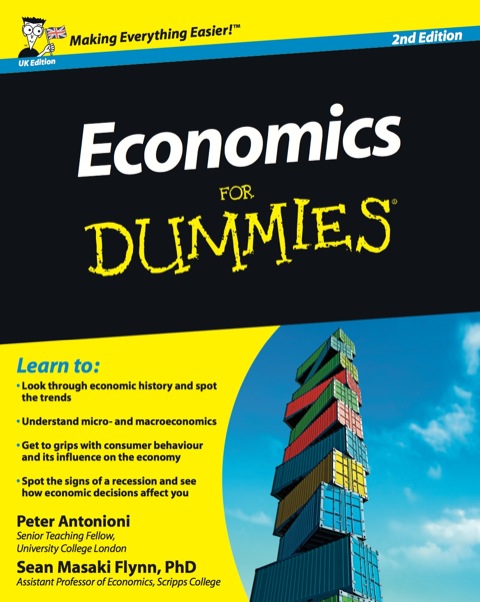Description
Efnisyfirlit
- About the Authors
- Dedication
- Authors’ Acknowledgments
- Contents at a Glance
- Table of Contents
- Introduction
- About This Book
- Conventions Used in This Book
- What You’re Not to Read
- Foolish Assumptions
- How This Book Is Organised
- Icons Used in This Book
- Where to Go from Here
- Part I: Economics: The Science of How People Deal with Scarcity
- Chapter 1: What Does Economics Study? And Why Should You Care?
- Considering a Little Economic History
- Sending Macroeconomics and Microeconomics to Separate Corners
- Framing Economics as the Science of Scarcity
- Zooming Out: Macroeconomics and the Big Picture
- Getting up Close and Personal: Microeconomics
- Understanding How Economists Use Models and Graphs
- Chapter 2: Cake or Ice Cream? Tracking Consumer Choices
- Considering a Model of Human Behaviour
- Maximising Happiness Is the Objective
- Red Light: Examining Your Limitations
- Making Your Final Choice
- Exploring Limitations and Violations of the Economist’s Choice Model
- Chapter 3: Producing the Right Stuff in the Right Way to Maximise Human Happiness
- Reaching the Limit: Determining What’s Possible to Produce
- Determining What Should Be Produced
- Encouraging Technology and Innovation
- Part II: The Science of Economic Growth and Stability
- Chapter 4: Measuring the Macroeconomy: How Economists Keep Track of
- Using GDP to Track the Economy
- Introducing the GDP Equation
- Understanding How International Trade Affects the Economy
- Chapter 5: Inflation Frustration: Why More Money Isn’t Always a Good Thing
- Buying an Inflation: The Risks of Too Much Money
- Measuring Inflation: Price Indexes
- Pricing the Future: Nominal and Real Interest Rates
- Chapter 6: Understanding Why Recessions Happen
- Examining the Business Cycle
- Striving for Full-Employment Output
- Returning to Y*: The Natural Result of Price Adjustments
- Responding to Economic Shocks: Short-Run and Long-Run Effects
- Heading toward Recession: Getting Stuck with Sticky Prices
- Achieving Equilibrium with Sticky Prices: The Keynesian Model
- Chapter 7: Fighting Recessions with Monetary and Fiscal Policy
- Stimulating Demand to End Recessions
- Generating Inflation: The Risk of Too Much Stimulation
- Figuring Out Fiscal Policy
- Dissecting Monetary Policy
- Part III: The Science of Consumer and Firm Behaviour
- Chapter 8: Supply and Demand Made Easy
- Making Sense of Markets
- Deconstructing Demand
- Sorting Out Supply
- Interacting Supply and Demand to Find Market Equilibrium
- Adjusting to New Market Equilibriums When Supply or Demand Changes
- Constructing Impediments to Market Equilibrium
- Chapter 9: Getting to Know Homo Ecoonomicus, the Utility-Maximising Consumer
- Knowing the Name of the Game: Constrained Optimisation
- Finding a Common Denominator to Measure Happiness: Utility
- Getting Less from More: Diminishing Marginal Utility
- Choosing among Many Options When Facing a Limited Budget
- Deriving Demand Curves from Diminishing Marginal Utility
- Chapter 10: The Core of Capitalism: The Profit-Maximising Firm
- Maximising Profits Is a Firm’s Goal
- Facing Competition
- Analysing a Firm’s Cost Structure
- Comparing Marginal Revenues with Marginal Costs
- Pulling the Plug: When Producing Nothing Is Your Best Bet
- Chapter 11: Why Economists Love Free Markets and Competition
- The Beauty of Competitive Free Markets: Ensuring That Benefits Exceed Costs
- When Free Markets Lose Their Freedom: Dealing with Deadweight Losses
- Hallmarks of Perfect Competition: Zero Profits and Lowest Possible Costs
- Chapter 12: Monopolies: How Badly Would You Behave If You Had No Competition?
- Examining Profit-Maximising Monopolies
- Comparing Monopolies with Competitive Firms
- Considering Examples of Good Monopolies
- Regulating Monopolies
- Chapter 13: Oligopoly and Monopolistic Competition: Middle Grounds
- Choosing to Compete or Collude
- Cartel Behaviour: Trying to Imitate Monopolists
- Understanding the Prisoner’s Dilemma Model
- Applying the Prisoner’s Dilemma to Cartels
- Regulating Oligopolies
- Studying a Hybrid: Monopolistic Competition
- Chapter 14: Property Rights and Wrongs
- Allowing Markets to Reach Socially Optimal Outcomes
- Examining Externalities: The Costs and Benefits Others Feel from Our Actions
- Taking in the Tragedy of the Commons
- Chapter 15: Market Failure: Asymmetric Information and Public Goods
- Facing Up to Asymmetric Information
- Providing Public Goods
- Part IV: The Part of Tens
- Chapter 16: Ten (Or so) Famous Economists
- Adam Smith
- David Ricardo
- Karl Marx
- Alfred Marshall
- John Maynard Keynes
- Kenneth Arrow and Gerard Debreu
- Milton Friedman
- Paul Samuelson
- Robert Solow
- Gary Becker
- Robert Lucas
- Chapter 17: Ten Seductive Economic Fallacies
- The Lump of Labour Fallacy
- The World Is Facing an Overpopulation Problem
- The Fallacy of Confusing Sequence with Causation
- Protectionism Is the Best Solution to Foreign Competition
- The Fallacy of Composition
- If It’s Worth Doing, Do It 100 Per Cent
- Free Markets Are Dangerously Unstable
- Low Foreign Wages Mean That Rich Countries Can’t Compete
- Tax Rates Don’t Affect Work Effort
- Forgetting That Policies Have Unintended Consequences Too
- Chapter 18: Ten Economic Ideas to Hold Dear
- Society Is Better Off When People Pursue Their Own Interests
- Free Markets Require Regulation
- Economic Growth Depends on Innovation
- Freedom and Democracy Make Us Richer
- Education Raises Living Standards
- Protecting Intellectual Property Rights Promotes Innovation
- Weak Property Rights Cause Many Environmental Problems
- International Trade Is a Good Thing
- Free Enterprise Has a Hard Time Providing Public Goods
- Preventing Inflation Is Easy(ish)
- Appendix: Glossary
- Index






Reviews
There are no reviews yet.